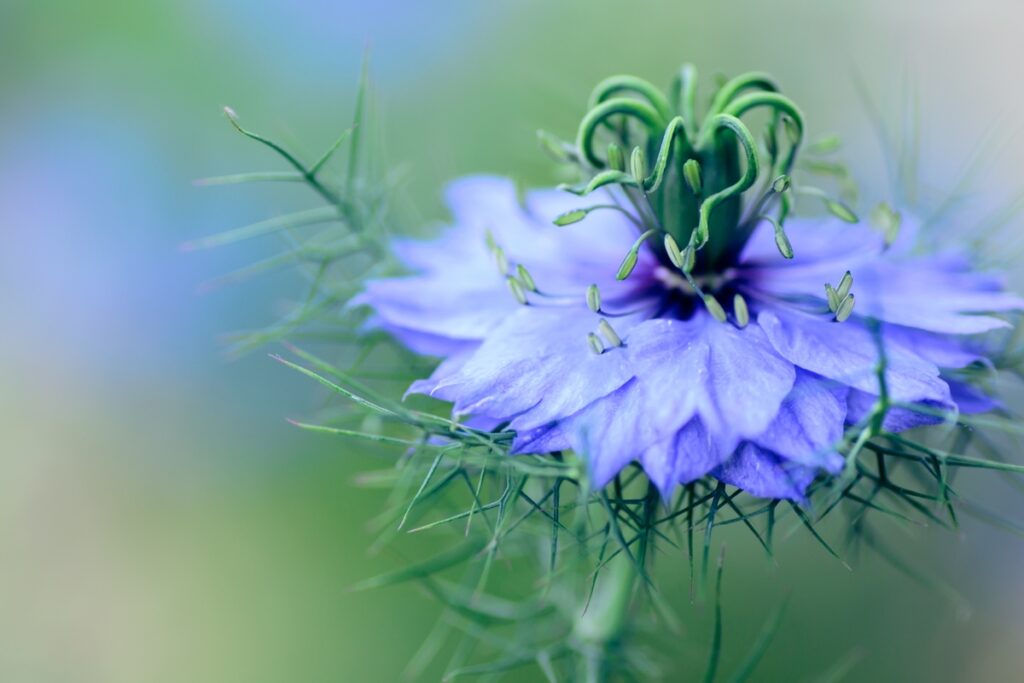Called the Miracle Herb Nigella sativa, also known as black cumin, is praised for both its culinary and medicinal uses. It is being studied for its antioxidant, anti-inflammatory, and potential anticancer properties.

Credit: public domain image here
As you can see by this photo, the overall look is quite distinctive and attractive. The flower is often described as ethereal or whimsical due to its delicate structure and soft colors.
This unique appearance, combined with its culinary and medicinal uses, makes Nigella sativa a favorite in both gardens and kitchens.
The Miracle Herb Nigella Sativa Medicinal Uses
The seeds contain thymoquinone, which is the active compound that is studied for its potential antioxidant, anti-inflammatory, and anticancer properties.
Thid research suggests that Nigella sativa may have several health benefits, such as for its:
- Antioxidant Effects:
The seeds have strong antioxidant properties, which can protect the body from oxidative damage caused by free radicals. - Anti-inflammatory Properties:
It has been used to treat inflammation-related conditions, such as arthritis. - Immune System Support:
Nigella sativa is believed to boost the immune system, helping the body fight off infections. - Heart Health:
Some studies suggest it can improve cholesterol levels and heart health. - Antidiabetic Effects:
It may help in regulating blood sugar levels, beneficial for people with diabetes. - Cancer Research:
Early research indicates potential anti-cancer properties, though more extensive studies are needed.
It’s also used in traditional remedies for a range of ailments, including asthma, hypertension, and digestive issues.
However, it’s important to note that while Nigella sativa has a long history of use in traditional medicine and shows promise in preliminary research, more comprehensive clinical studies are needed to fully understand its effects and potential benefits.
See a review on this herb’s potential at the National Library of Medicine, here.
As with any supplement, it should be used with caution and in consultation with a healthcare professional.
The Miracle Herb Nigella sativa has a rich history intertwined with folklore, traditional medicine, and cultural practices across various regions.
This plant’s seeds and oil have been revered for centuries, particularly in the Middle East, Asia, and Africa, for their perceived health benefits and mystical properties.
Historical and Cultural Significance
Ancient Civilizations: Nigella sativa has been used since ancient times. It was found in the tomb of Egyptian Pharaoh Tutankhamun, suggesting its importance in ancient Egyptian culture. The seeds were also known in the ancient Greco-Roman world.
Islamic Tradition: In Islamic tradition, Nigella sativa holds significant value. It’s often quoted that Prophet Muhammad said that black cumin could cure every disease except death, elevating its status to a kind of panacea in Islamic medicine.
Ayurveda and Unani: In Ayurvedic and Unani systems of medicine, native to the Indian subcontinent, black cumin has been used to treat a variety of ailments, from digestive issues to respiratory conditions.
Folklore and Traditional Beliefs
Protective Charm: In some cultures, Nigella sativa was believed to ward off evil spirits. Seeds were carried, placed in homes, or used in rituals to offer protection.
Symbol of Love and Harmony: In some Middle Eastern cultures, the seeds were used in romantic rituals and believed to foster love and harmony in relationships.
Culinary and Medicinal Uses: Traditionally, the seeds were used in cooking for their distinct flavor and were also consumed for their supposed health benefits. The oil, extracted from the seeds, was used topically and internally for various health concerns.
Medicinal Folklore
- Cure-All: Consistent with the saying in Islamic tradition, Nigella sativa was often considered a universal healer, used to treat everything from headaches and toothaches to more serious ailments.
- Digestive Health: It was commonly used to aid digestion, relieve gas, and stimulate appetite.
- Immune Booster: Believed to strengthen the immune system, it was a go-to remedy for colds, flu, and infections.
- Skin and Hair: The oil was popular for skincare and hair treatments, believed to promote skin health and hair growth.
- Anti-Inflammatory and Pain Relief: Used for its anti-inflammatory properties, it was a remedy for arthritis and other inflammatory conditions.
Modern Perspective
While many of these uses are rooted in folklore and traditional medicine, modern scientific research is exploring the potential health benefits of Nigella sativa.
Studies have investigated its antioxidant, anti-inflammatory, antimicrobial, and anticancer properties. However, it’s important to approach these traditional beliefs with a balance of respect for cultural heritage and critical scientific evaluation.
